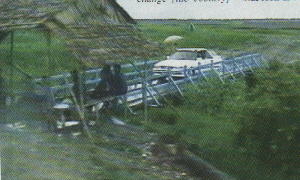The dissident and the club pursue different aims.
(Asiaweek Aug7,1998)
By TIM HEALY AND ANTONIO LOPEZ MANILA
On a rickety wooden bridge a few meters from the main highway between
Yangon and Pathein, Myaninar opposition leader Aung San Suu Kyi sits in
the back seat of a white, twodoor sedan and waits in the wilting heat.
Twenty seven hundred kilometers away, enjoying the air-conditioned comfort
of the posb Manila Hotel, a collection of high powered foreign ministers
from around the world sip tea and discuss The Lady's plight. Curiously,
the drama has played out in completely different venues two time zones
apart a fact that serves the interests of actors in both places.

Several did. U.S. Secretary of Stat( Madeleine Aibright produced a long list 0 complaints about Myanmar: "Arrest. aimed at decimating the opposition contin uc. The economy is falling apart. And whole generation of young people is bein~ lost as universities, and now even higl schools, stay closed for fear of unrest. She and the European Union's Wolfgan~ Schussel, the Austrian foreign minister urged Yangon to hold a "results-oriente( dialogue" with Suu Kyi. Myanmar re sponded by alleging that Suu Kyi hai secured the support of Western embassie and that the whole automobile inciden 'had been deliberately created."
The assertion is plausible, but it doe not explain why for the third time in a many weeks the ruling junta allowed So Kyi to drive far out of town before stopping her, thus creating the opportunity for a pub lic confrontation. Her car would have passed checkpoints leaving Yangon before reaching the spot where she was stopped. Was it an oversight, or did the junta aim to use the incidents as a pretext for clamping down? In the end, six of ASEAN's 10 dialogue partners Canada, Japan, the U.S., the E.U., Australia and New Zealand criticized Myaninar for restricting Suu Kyi. ASEAN and the dialogue partners together form the ASEAN Regional Forum or ARF.
Indeed, for a time it seemed ASEAN was back to its old, all-for-one-and-one-for- all camaraderie. On the subject of Cambodia's ASEAN membership, which was put off a year ago after Co-Premier Hun Sen executed a putsch against his partner, Prince Norodom Ranariddh, there seemed unanimous agreement: Membership would be granted by the end of the year. That would bring ASEAN's membership to 10 and reward Phnom Penh for holding elections that had satisfied international observers as being fair (though not Run Sen's two main opponents).
Siazon seemed to be flexibly engag- ing everyone in sight. At one point, he called on leaders from the U.S., E.U. and Japan to come to the aid of ASEAN economically. "Considering that the financial and currency turmoil in Asia has world- wide roots as well as global consequences, shared international responsibility in restoring economic stability in Asia must be recog- nized," said the Philippine foreign minister. But the plea appeared not to be effective. Schussel told the assemblage on behalf of the E.U. that it is willing to provide technical assistance if requested." Japan said it would do everything it can but didn't specify what that might be. And Albright would only lecture about the need for transparency and open markets.
On one point at least, ASEAN and its dialogue partners agreed: the nuclear bomb tests in India and Pakistan were deplorable. Unsurprisingly, India rejected the criticism. (Pakistan is not a dialogue partner and was not formally represented in Manila). Jaswant Singh, deputy chairman of India's Planning Commission, told Asiaweek: "We have explained the necessity of our nuclear testing to the ministers. How can I deplore my own country?" However, given that this decision was likely to be the only unambiguous statement that emerged from the entire meeting, India didn't have muct chance in stopping it. The joke in Manila last week was that ASEAN was actually NATO in disguise. But unlike the actual North Atlantic Treaty Organization fo which the acronym stands, the Asian varia- tion had quite a different meaning: "No action, talk only."
- With additional reporting by Roger Mitton